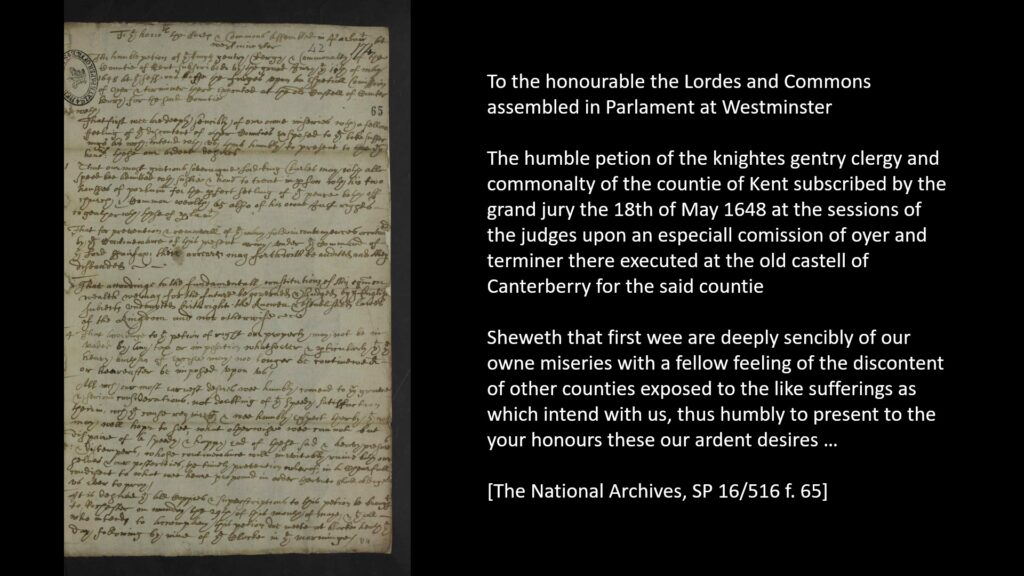During the reign of Charles I, the king and his councillors received hundreds of petitions every year. Then, after civil war broke out in 1642, the new Parliamentary regime in London began receiving petitions as well. As part of ‘The Power of Petitioning’ project, we have transcribed and published almost 400 of these manuscripts from across the seventeenth century on British History Online. We also completed a six-month Shared Learning Project with a large group of amateur researchers from the London Region of the University of the Third Age.
Each of these researchers wrote one or more reports about the petitioners and their requests or complaints. The introduction to this U3A project includes much more information, including important caveats about accuracy and interpretation. This set of 36 reports cover the second quarter of the seventeenth century, from the accession of Charles I in 1625 to his execution in 1649.
The reports include the intriguing case of the Lion, a merchant’s ship seized by Algerian pirates and then spotted seven years later in the Thames ‘manned by Italians, Turkes, and English bound for Holland’. As Graham Camfield explains, the owners wanted it back and they sought help from the Admiralty in 1629. Another case from a few years later throws light on a long-running struggle between puritans and anti-puritans in Great Yarmouth. Lesley Scott-Stapleton provides illuminating background on an alderman’s counter-petition against an allegedly false petition by his local adversaries in 1632. A more overly ‘political’ petition came in 1645, in the midst of the Civil Wars, from ‘the distressed county’ of Cumberland, presented by the MP Richard Barwiss. In his report, David Moffatt explains their complaints about taxes and the Scottish army occupying the county, and also tracks the hostile response that the petition received by Parliament.

These are merely a few of the reports that can be read below, which offer insights into the challenges and complaints that reached the ears of authorities under Charles I and during the Civil Wars.
The Petitions and the Reports
- 1626, the Barons of the Cinque Ports ask to join Charles I’s coronation ceremony
- 1627, Peter Canon seeks to be restored an Admiralty office after being expelled
- 1628, John Cooke petitions to be the keeper of Hartwell Park, Northamptonshire
- 1629, the Bishop of Worcester asks for the restoration of his privileges within Oswaldslow
- 1629, the owners of a ship seized by Algerian pirates seek to reclaim it
- 1631, Joseph Harrison and Henry Goodwin request a royal office with a suitable salary
- 1631, Sir William Russell petitions for royal favour in his struggles with the Muscovy Company
- 1632, Benjamin Couper of Great Yarmouth complains of a vexatious petition against him
- 1633, John Waterman seeks the post of Master Carpenter on a new ship
- 1633, Philip Clarkson asks to be appointed as Master Gunner
- 1634, Richard King, clerk, seeks a more profitable employment
- 1634, William Thomas seeks reimbursement for his costs as a ship’s purser
- 1635, John Bridgehampton alias Hickes seeks to have all master gunners wear a special badge of his own design
- 1635, Thomas Askew begs forgiveness for allowing the Dutch to export oysters from Faversham
- 1636, a group creditors led by William Hanson seek repayment for victualling the navy
- 1636, Milicent Birkenhead and Edward Thoroughgood seek to profit from issuing passports
- 1638, Robert and Margaret Bulkeley claim that their step-father is plotting against them
- 1638, William Carne tries to get out of the tobacco licencing trade
- 1640, John Wilkinson alleges the John Spy of Hastings flouted royal authority over imported hats
- 1641, John Meredith petitions for a hearing in the Court of Wards about the late Matthew Thimbleby’s property
- 1643, Rowland Wilson and 34 other merchants complain that their ships have been seized by Royalists
- 1643, Stiles Sowgate of Harwich complains that his cargo of grain was seized by tumultuous local people
- 1643, Thomas Millard, gunner’s mate, asks to the Committee for the Navy and Customs for his backpay
- 1644, Edmund Felton petitions for support for his war engines
- 1644, Lady Mary Gee complains that the tenant of her Yorkshire manor is withholding rent
- 1644, Richard Vickris of Bristol, merchant, petitions about debts unpaid and losses to the Royalists
- 1644, Robert Curtis claims that his coal ship was mistakenly seized by a Parliamentary warship
- 1645, the inhabitants of the distressed county of Cumberland complain to the House of Commons about punitive taxes and the Scottish army
- 1645, William Ryley, record-keeper at the Tower of London, petitions for his arrears of pay
- 1646, Richard Crossing, merchant, hopes to be reimbursed for canvas seized by a Parliamentary warship
- 1647, the owners of the ship the Constant Warwick ask to be authorised to seize enemy vessels
- 1647, thirteen officers of the Kentish regiment complain about their commander, Colonel Lilburne
- 1647, William Sykes claims his loyalty to Parliament cost him his father’s favour
- 1648, John Langley, a wounded veteran, asks for arrears of pay after serving under General Fairfax at Naseby
- 1648, the Knights, Gentry, Clergy and Commonalty of Kent petition for Parliament to make peace with Charles I
For further petitions and reports from the rest of the seventeenth century, return to the main ‘Investigating Petitioners’ page.
